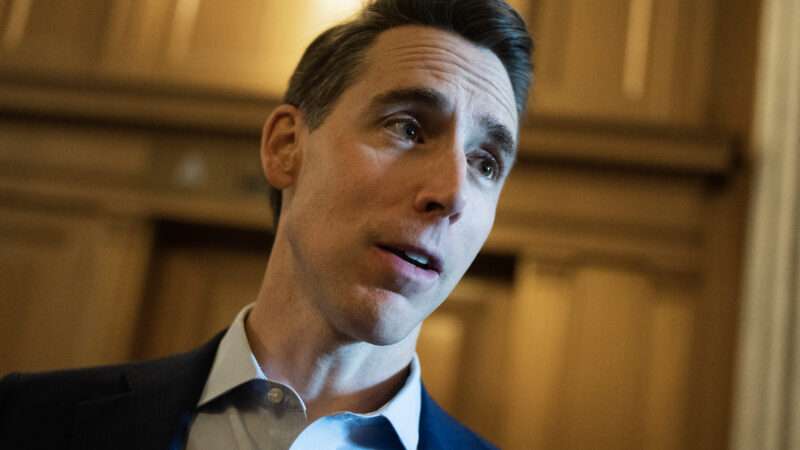
As the deadline for reaching a deal to raise to debt limit nears, Sen. Josh Hawley (R–Mo.) says any agreement should include a massive tax hike on Americans.
Earlier this month, Hawley introduced a bill to impose an additional 25 percent tariff on all imports from China—above and beyond existing tariffs on many of those same products. Hawley's bill, the Raising Tariffs on Imports From China Act, would allow a future president to remove that 25 percent import tax on goods from China only after the United States records a bilateral trade surplus with China for a full year.
"Strong tariffs on China should be a major part of any debt ceiling agreement," the senator said in a statement announcing his bill earlier this month.
Tariffs, of course, are nothing more than taxes paid by importers and passed along to consumers. The past five years have provided a striking real-world experiment in that basic principle of economics, as study after study has found that former President Donald Trump's tariffs on Chinese goods (and other imports too) resulted in higher prices and contributed to overall inflation. Hawley might call them "tariffs on China," but that's obvious nonsense: Tariffs are paid by Americans.
But Hawley seems determined to make Americans pay higher taxes. Earlier this year, he introduced a different bill to prevent the United States from applying so-called "normal" tariff rates—that is, the rates charged on imports from all World Trade Organization (WTO) member countries—on imports from China.
Effectively, that change would hike average tariff rates on Chinese imports from 11.1 percent to 40.9 percent, according to an analysis from Bryan Riley, director of the free trade initiative at the National Taxpayers Union (NTU), a free market nonprofit. The rates for some common imports would jump far higher: Shoes and clothing from China would be marked up by 59 percent, while children's toys would see an extra 70 percent tax applied. Increased import taxes could add $86 to the price of smartphones from China, $111 to laptop computers, and $39 to video game consoles, according to NTU's analysis.
If passed into law, Riley says, Hawley's proposal would amount to the largest tariff increase on American consumers in nearly a century—since the passage of the "Smoot-Hawley" (no relation) tariffs in 1930, which economists now widely credit with extending and worsening the Great Depression.
Americans have struggled through two years of heightened inflation and rising interest rates. Hawley needs to explain why raising import taxes should be a priority right now.
When asked during a Friday appearance on Fox Business about the potential economic downsides to hiking tariffs right now, Hawley largely avoided the question. Instead, he insisted that "we need to bring back good-paying blue-collar jobs to this country" and blamed China's membership in the WTO for that decline.
That's a common refrain from the New Right, but it's both economically inaccurate and nonsensical as a justification for raising tariffs.
Indeed, tariffs won't create jobs in the United States—they will destroy them, as higher taxes always do.
For example, look at what happened when Trump imposed 25 percent tariffs on steel imports. The higher prices created by the tariffs benefited the domestic steel manufacturing industry but caused greater job losses in steel-consuming industries. "A small boost from the import protection effect of tariffs is more than offset by larger drags from the effects of rising input costs and retaliatory tariffs," a pair of economists from the Federal Reserve concluded in one study.
Industry representatives have said the same thing: "Any gains seen by the steel industry from the tariffs has been overshadowed by the losses in the companies downstream," Stuart Speyer, president of Tennsco LLC, a Tennessee-based metal fabrication firm, told the International Trade Commission at a hearing last year.
China's membership in the WTO hasn't been costly for the United States either. The availability of cheap imports from China has actually been a major boon for American manufacturing over the past few decades—no matter what Trump, Hawley, and others might claim. Between 2000 and 2021, manufacturing imports from China to the U.S. increased by $391 billion, but American manufacturing output increased by $947 billion during the same period.
The number of manufacturing jobs in the United States has declined largely due to automation and high labor costs, not because of competition with China. Tariffs won't change any of that. All they will do is make it more expensive for American manufacturers to do what they do best these days: use global supply chains to churn out high-end goods.
It's telling that Hawley isn't the only American senator pushing to revoke China's "normal trade relations" status. Sen. Bernie Sanders (I–Vt.) campaigned for president in 2020 on a promise to hike tariffs on Chinese imports and has frequently complained about China's membership in the WTO. (Sanders even introduced a bill in 2005 to do pretty much exactly what Hawley's bill aims to do now.)
As a general rule: If you're pushing an economic policy also endorsed by an avowed socialist, you might want to reconsider. Fittingly, when it comes to tariff policy, Hawley and the rest of the New Right are slipping into one of the same economic fallacies that has often bedeviled progressives like Sanders: judging policy by intention rather than outcomes.
You can say the words "tariffs," "China," and "good-paying blue-collar jobs" as many times as you'd like. It'll never add up the way Hawley keeps promising. Higher import taxes that will be paid by American businesses and consumers is a recipe for slowing the economy and punishing productive people. It won't accomplish anything else.
The post Josh Hawley Wants the Debt Ceiling Deal To Include a Massive Tax Hike on Americans appeared first on Reason.com.







